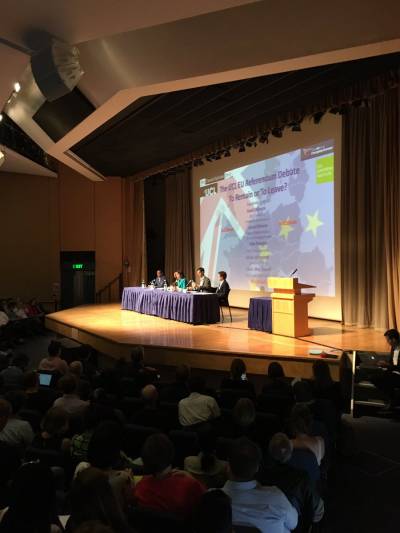Brexit: Its Constitutional Consequences for Britain and Europe

The referendum on 23 June on the UK’s future membership of the European Union raised many important issues. This special seminar series and briefing papers – organised jointly by the UCL Constitution Unit, UCL European Institute, and UCL School of Public Policy – focused on a crucial subset of these issues: the constitutional consequences that Brexit would have for the UK, for the EU, and for other EU member states.
The seminars brought together leading practitioners and academics from the UK and around Europe to debate the issues. The briefing papers drew on the seminars and other materials to sum up current expert opinion on each issue. Both the seminars and the briefing papers were generously supported by the UK in a Changing Europe project.
The series concluded with a major debate on all aspects of the Brexit question.
- Brexit: Its Consequences for Westminster & Whitehall - Briefing Paper & Video
21st April
This seminar considered the implications for Whitehall and Westminster both of Brexit itself and of the process of negotiating Brexit. How would Whitehall manage the negotiating process and what would be the role of Westminster? How would the UK's new relationship with the EU be managed post-Brexit? Would Brexit require a re-configuration within Whitehall or Westminster?
Speakers include:
- Sir Simon Fraser, former Permanent Under Secretary at the Foreign and Commonwealth Office
- Professor Hussein Kassim, UEA, co-author of The European Commission of the Twenty-First Century
- Lord Lisvane, former Clerk of the House of Commons
Chair:
- Dr Nick Wright, Teaching Fellow in EU Politics at UCL
Vimeo Widget Placeholderhttps://vimeo.com/165268868 - Brexit: Its Consequences for the EU's Political System - Briefing Paper & Video
5 May
How would Brussels manage the negotiation process, constitutionally and politically? What would be the short-term institutional consequences of Brexit for the UK's MEPs, the 2017 UK Presidency, and voting rights in the Council of Ministers? In the long run, how would Brexit impact on the balance of power between member states in the EU's policy-process?
Speakers include:
- Professor Kenneth Armstrong, Professor of European Law, University of Cambridge
- Professor Simon Hix, Harold Laski Professor of Political Science, LSE
- Sir Stephen Wall, Official Historian at the Cabinet Office and former Permanent Representative to the European Union
Chair:
- Dr Christine Reh, Senior Lecturer in European Politics at UCL
Vimeo Widget Placeholderhttps://vimeo.com/167131532 - Brexit: Its Consequences for Devolution & the Union - Briefing paper & Video
19 May
What will happen if the UK votes to leave the EU, but a majority in Scotland, Wales or Northern Ireland vote to remain? Will such an outcome trigger a second Scottish referendum on independence? Would Wales or Northern Ireland follow suit? What would the broader implications of Brexit be for the devolved areas of the UK, for example in terms of loss of EU funding?
Speakers include:
- Professor Sionaidh Douglas-Scott, QMUL, author of Constitutional Law of the European Union
- Jim Gallagher, former Director General, Devolution Strategy, Cabinet Office; Visiting Professor, University of Glasgow; Associate Member, Nuffield College, Oxford
- Professor Cathy Gormley-Heenan, Professor of Politics, University of Ulster
- Dr Rachel Minto, Research Associate, Centre for European Law and Governance, Cardiff School of Law and Politics
Chair:
- Professor Robert Hazell, Professor of Government and the Constitution at UCL
Vimeo Widget Placeholderhttps://vimeo.com/168454709 - Brexit: Its Consequences for Other Member States - Briefing Paper & Video
2 June
What are the likely effects of Brexit on politics within other member states? Would Brexit change remaining member states' relationships with the EU? Would it affect decision-making within member states? We will explore how these issues might play out in a diverse range of member states, including Ireland - the UK's closest neighbour -, long-standing member states such as Germany and the Netherlands, and newer members such as Poland and Romania.
Speakers include:
- Agata Gostyńska-Jakubowska, Research Fellow at the Centre for European Reform and former Senior Research Fellow at the Polish Institute of International Affairs
- Dr Sara Hagemann, Assistant Professor, LSE European Institute
- Alan Posener, Correspondent on Politics and Society for Die Welt
- Brian O'Connell, UK Consultant Director of the British Irish Chamber of Commerce and former London Editor for RTE News
Chair:
- Dr Alan Renwick, Deputy Director of the Constitution Unit
Vimeo Widget Placeholderhttps://vimeo.com/170762863 - The UCL EU Referendum Debate: To Remain or To Leave?
Thursday 16 June 2016, 6-7.30pm
Following the shocking murder of the MP for Batley and Spen, Jo Cox, campaigning for the EU referendum was suspended on 16 June 2016. The planned UCL EU Referendum Debate, which had been due to feature leading figures from both campaigns, was therefore changed into a Meet the Experts Q&A. A panel of academics with expertise in the politics and economics of the EU and the processes around the referendum answered a wide range of questions from audience members.
The panellists were:
- Professor Anand Menon, Professor of European Politics and Foreign Affairs at King's College London and Director of the UK in a Changing Europe initiative
- Dr Swati Dhingra, Lecturer in Economics at the London School of Economics and at the LSE's Centre for Economic Performance
- Dr Simon Usherwood, Senior Lecturer in Politics at the University of Surrey and Fellow of the UK in a Changing Europe initiative
- Dr Alan Renwick, Deputy Director of the Constitution Unit at UCL.
Chair:
- Professor Meg Russell, Director of the Constitution Unit.
The event was organised by the UCL Constitution Unit, UCL School of Public Policy, and UCL European Institute.
YouTube Widget Placeholderhttps://www.youtube.com/watch?v=XYpjAlLQ_VM
 Close
Close



